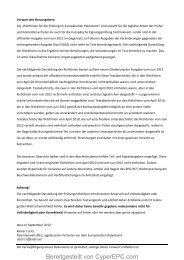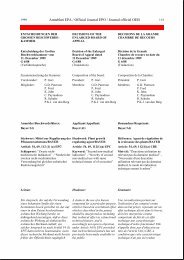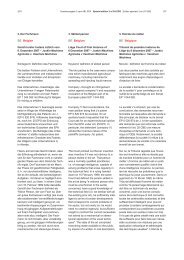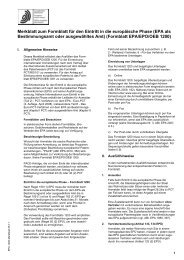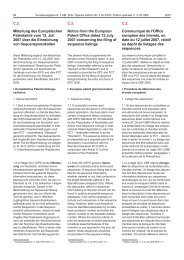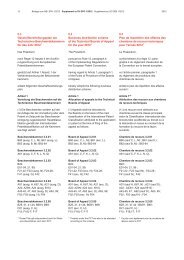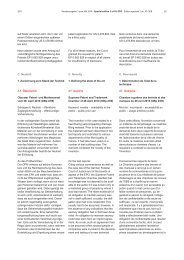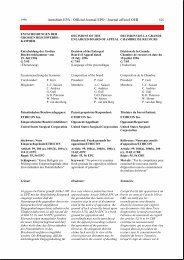Sonderausgabe 1 zum AB - CyberEPC
Sonderausgabe 1 zum AB - CyberEPC
Sonderausgabe 1 zum AB - CyberEPC
You also want an ePaper? Increase the reach of your titles
YUMPU automatically turns print PDFs into web optimized ePapers that Google loves.
132 <strong>Sonderausgabe</strong> 1 <strong>zum</strong> <strong>AB</strong>l. EPA Special edition 1 of OJ EPO Edition spéciale 1 du JO OEB 2011<br />
sich dieses Verfahren von einem Verfahren<br />
zur Herstellung der Verbindung B<br />
unterscheidet. Man durfte aber nicht<br />
identische Verfahrensschritte einfach<br />
durch ein Merkmal neu monopolisieren,<br />
das sich auf die Absicht des Benutzers<br />
bezog.<br />
10. Das Standardwerk <strong>zum</strong> Patentrecht<br />
des Anwalts Blanco-White enthält einen<br />
mit "For" überschriebenen Abschnitt 3 .<br />
Darin rät Blanco-White wegen der sich<br />
daraus ergebenden Auslegungsschwierigkeiten<br />
dringend von der Verwendung<br />
von Formulierungen wie "für ein<br />
Fahrrad" in Ansprüchen ab. Die Beschränkung<br />
eines Erzeugnisanspruchs<br />
auf ein bestimmtes Einsatzgebiet durch<br />
Verwendung des Wörtchens "for" führe<br />
tendenziell dazu,<br />
"bestenfalls reine Neuheit ohne erfinderischen<br />
Gegenstand zu verleihen, und<br />
schlimmstenfalls reine 'Neuheit des<br />
Zwecks'".<br />
11. Diese Textstelle ist interessant.<br />
"Reine Neuheit" suggeriert, dass der<br />
Anspruch tatsächlich neu ist, vermutlich,<br />
weil es einiger Anpassungen bedarf,<br />
damit sich das Erzeugnis für den neuen<br />
Zweck eignet. Die Schwierigkeit bei der<br />
Auslegung liegt darin, dass entschieden<br />
werden muss, wie viel Anpassung<br />
vorausgesetzt werden kann. "Ohne<br />
erfinderischen Gegenstand" suggeriert,<br />
dass eine solche Anpassung an den<br />
neuen Zweck als naheliegend anzusehen<br />
ist. Das mag in vielen Fällen<br />
zutreffen. Ein Beispiel könnte eine Klingel<br />
eines Typs sein, der als Türklingel<br />
bekannt ist, von der aber angegeben<br />
wird, sie sei "für ein Fahrrad". Einige<br />
Anpassungen, mit denen die Klingel<br />
dafür tauglich gemacht wird, an einem<br />
Fahrrad befestigt zu werden, müssten<br />
im Anspruchswortlaut ihre Entsprechung<br />
finden. Ob der Fachmann tatsächlich<br />
daran denken würde, diese besondere<br />
Türklingel für ihre Verwendung an einem<br />
Fahrrad anzupassen, wäre eine Tatfrage.<br />
12. Wenn Blanco-White von "schlimmstenfalls<br />
reine Neuheit des Zwecks"<br />
spricht, denkt er dabei vermutlich an die<br />
Fälle, in denen das Wort "for" keine<br />
Anpassung des Erzeugnisses impliziert.<br />
Ein bekannter Lack "<strong>zum</strong>" Anstreichen<br />
compound B. But one could not<br />
re-monopolise identical process steps<br />
simply by means of a feature relating<br />
to the user's intention.<br />
10. In Mr Blanco-White QC's classic<br />
book on the Law of Patents he has a<br />
section headed "For" 3 . He counselled<br />
strongly against the use of expressions<br />
such as "for a bicycle" in claims,<br />
because of the difficulties of interpretation<br />
they gave rise to. He said that<br />
limiting the product claim to a particular<br />
field by use of the word "for" would:<br />
"at best tend to give bare novelty without<br />
inventive subject-matter; at worst, mere<br />
'novelty of purpose'".<br />
11. That passage is interesting. "Bare<br />
novelty" suggests that the claim is in fact<br />
novel: presumably because making the<br />
article suitable for the new purpose<br />
requires some adaptation. The difficulty<br />
in interpretation lies in deciding how<br />
much in the way of adaptation is to be<br />
implied. "Without inventive subjectmatter"<br />
suggests that such adaptation<br />
for the new purpose is to be presumed to<br />
be obvious. In many cases that may be<br />
true. An example might be a type of bell<br />
known for a doorbell, but specified to be<br />
"for a bicycle". Some adaptation to make<br />
it suitable for attaching to a bicycle would<br />
be a requirement of the claim. Whether<br />
the skilled person would in fact think of<br />
adapting that particular doorbell for its<br />
use on a bicycle would be a question of<br />
fact.<br />
12. When Mr Blanco-White said "at<br />
worst mere novelty of purpose" he is<br />
presumably thinking of a case in which<br />
no adaptation of the product is implied<br />
by the word "for". A known type of paint<br />
"for" painting bridges would be an<br />
se distingue, très probablement et par<br />
essence, d'un procédé de fabrication<br />
d'un composé B. On ne peut cependant<br />
pas breveter à nouveau les étapes d'un<br />
procédé identique en arguant simplement<br />
d'une caractéristique liée à l'intention<br />
de l'utilisateur.<br />
10. L'ouvrage de référence de<br />
M. Blanco-White sur le droit des brevets<br />
comporte un chapitre intitulé "De", par<br />
exemple dans l'expression "appareil<br />
de" 3 . L'auteur conseille vivement de ne<br />
pas utiliser dans une revendication des<br />
expressions comme "de bicyclette" en<br />
raison des difficultés d'interprétation que<br />
cela soulève. Selon M. Blanco-White, le<br />
fait de limiter la revendication de produit<br />
à un domaine particulier en utilisant le<br />
mot "de" aurait pour effet :<br />
"dans le meilleur des cas, de conférer à<br />
ce produit une simple nouveauté sans<br />
activité inventive et au pire, une simple<br />
'nouveauté en termes de finalité'".<br />
11. Ce passage est intéressant. L'expression<br />
"simple nouveauté" donne à<br />
penser que la revendication est en fait<br />
une nouveauté, et l'on peut supposer<br />
que la raison en est qu'il faut une<br />
certaine adaptation pour que l'objet de<br />
l'invention puisse servir à la nouvelle<br />
finalité. La difficulté au niveau de l'interprétation<br />
est de déterminer l'importance<br />
de l'adaptation qu'il faut prendre en<br />
compte. Les termes "sans activité inventive"<br />
suggèrent que l'on suppose que<br />
cette adaptation à la nouvelle finalité est<br />
évidente. Cela peut être vrai dans de<br />
nombreux cas. On pourrait prendre pour<br />
exemple une sonnette connue pour être<br />
une sonnette de porte, mais que l'on<br />
spécifierait être "pour une bicyclette". Il<br />
faudrait alors que la revendication inclue<br />
une certaine adaptation afin que cette<br />
sonnette puisse être fixée sur une bicyclette.<br />
La question de savoir si l'homme<br />
du métier penserait effectivement à<br />
adapter cette sonnette de porte afin<br />
qu'elle soit utilisée sur une bicyclette,<br />
serait une question de fait.<br />
12. Lorsque M. Blanco-White dit "au pire,<br />
une simple nouveauté en termes de finalité",<br />
il pense probablement à un cas où<br />
le mot "de", comme dans l'expression<br />
"appareil de", n'implique aucune adaptation<br />
du produit. Prenons par exemple un<br />
3 Patents for Inventions, T. A. Blanco White QC,<br />
1974 Paragraph 2-213 Seite 68-9.<br />
3 Patents for Inventions, T.A. Blanco White QC,<br />
1974 paragraph 2-213 page 68-9.<br />
3 Patents for Inventions, T.A. Blanco White QC,<br />
1974 paragraphe 2-213 page 68-9.



